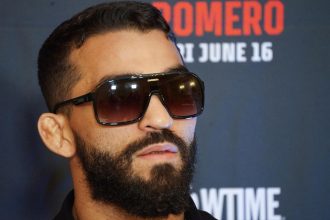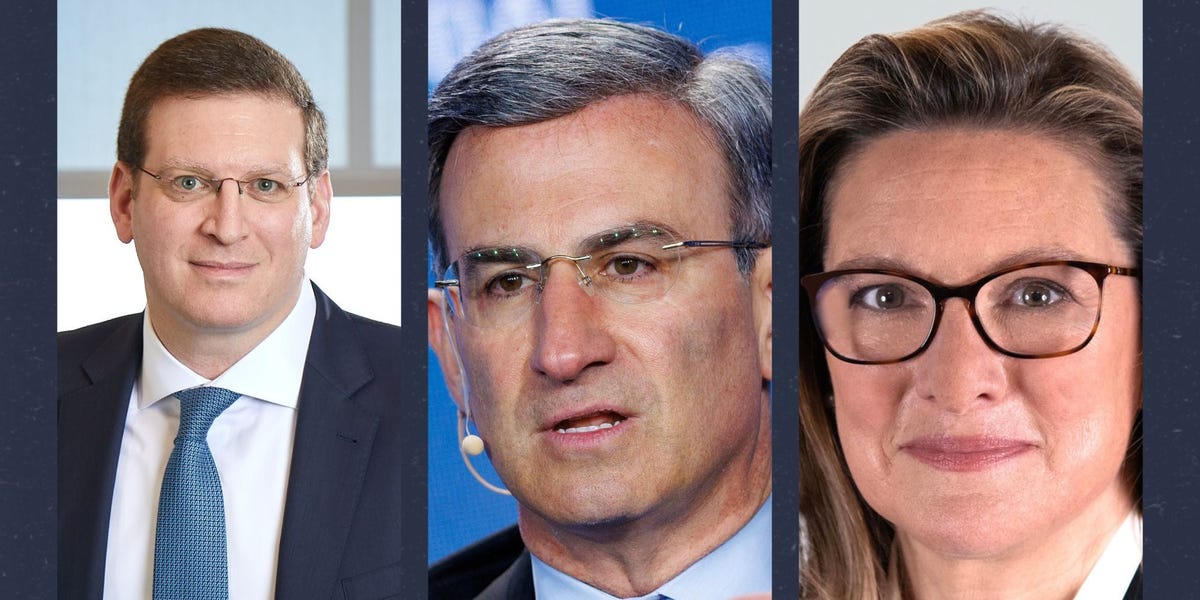- Lazard has taken a series of steps to improve its asset management arm, led by Evan Russo.
- The business, which has suffered from fund outflows, is a diversifier in a slow M&A market.
- Executives are close to hiring a new head of institutional sales, Insider has learned.
As the mercenary leader Yevgeny Prigozhin was leading what would be a short-lived rebellion in Russia last month, bankers up and down Wall Street were hunkered down, monitoring the situation.
At the investment bank Lazard, members of its geopolitical advisory team convened an internal Monday call to discuss that weekend’s uprising and its impact on the market and sanctions. The group extends guidance on geopolitical matters to clients as well as colleagues, like the asset management arm’s sprawling salesforce.
Lazard has a long history of giving advice during moments of crisis — to New York, famously, when the city narrowly avoided bankruptcy in 1975, and to the French government a century earlier on purchasing gold — and last year formed a team of military and intelligence experts. Its incoming chief executive is the economist Peter Orszag, a former advisor to Barack Obama and Bill Clinton known as a Washington power player before he moved to finance.
Providing unique advice is one way the boutique firm is aiming to reverse its fortunes as it stares down a dealmaking slowdown, a flagging stock price, and the challenges of running an active investment manager. Another way: through efforts to grow its $230 billion money management business now run by Evan Russo, a longtime Lazard executive who has been the chief executive of asset management for a year.
The firm is making a series of changes to ramp up its asset management business. It has hired a top distribution executive into a key, newly created role from BlackRock, the firm that dominates the industry, it’s nearing an announcement on hiring a new head of institutional sales, it’s reorganized its fund distribution structure, and it’s considering acquisitions in areas like private markets, executives told Insider.
Lazard has had an asset management business for decades, but it’s a business that’s finding new relevance on Wall Street. It’s a diversifier while deal flow is down, as it is now for Lazard and its competitors — this spring the financial advisory business reported a 29% decline in operating revenue from the year prior. It can also offer steady fees, similar to the way financial firms see the sticky business of wealth management. Asset management is also extremely crowded, and investors are increasingly shrinking the number of managers they work with.
Turning around asset management, which has grappled with fund outflows in recent years, represents a major test for both Russo and Orszag, who is set to take over in October and who has been the head of financial advisory.
Orszag’s ascent has come as Lazard has recently made other top personnel changes. Ray McGuire, the former Citi executive who ran for New York mayor in 2021, joined in April as president. Jennifer Ryan, a BlackRock veteran and an important hire for the asset management arm, joined in January as the head of distribution for North America.
Together, their teams face challenges as they seek to reinvigorate the storied business.
In an interview with Insider, Russo said that growing the asset management business comes down to improving investment performance, distribution — connecting more clients with the firm’s many actively managed funds — and the business’s infrastructure, like its technology.
“We’re moving from a period of what I call stability to our next phase of growth, and we’re setting the firm up for the opportunities ahead,” said Russo, who joined Lazard in 2007 as a banker from Goldman Sachs. He had been Lazard’s chief financial officer.
Active managers like Lazard’s have spent years trying to stem outflows as passive-investing vehicles have gathered steam. Operating as a small asset manager and fending off fee pressures has become increasingly difficult in an industry where the biggest players are getting bigger and can afford to sell low-fee products. And in the alternative investment space, competition for expanding by acquisition or building internally is fierce as traditional money managers push aggressively into high-fee assets like private credit and real estate.
Analysts, meanwhile, have questioned whether the asset management business should be sold entirely and why it makes sense to keep the two sides of the firm together, a strategy that executives have defended as complementary.
The asset management business is “still a ‘show-me’ story,” UBS analyst Brennan Hawken wrote in a note to clients in May, pointing to $17 billion of outflows last year alone. He said its fee rate, however, has stabilized in recent quarters in an encouraging sign. The first quarter’s management fees and operating revenue were both down from a year prior, and each measure rose from the fourth quarter.
Indeed, Lazard is better known as an international advisory firm with a long history of dealmaking.
“When it comes to the asset management business, the picture is probably more blurry,” said Richard Bruyère, managing partner of the Paris-based asset management advisory firm Indefi. The franchise is “emerging,” Bruyère said, and its US and European businesses could be better integrated.
A BlackRock veteran’s vision
Executives, including Orszag, have pointed to Ryan as a key hire to ramp up distribution and growth. In an interview with Insider, Ryan outlined some of the changes she and her team have put into effect, like reorganizing the institutional business so there is a clearer channel structure, grouped by types of clients like family offices and multiemployer pension funds known as Taft-Hartley plans, rather than by geography.
“The goal is to be a part of the ecosystem that your clients live in, know who the big allocators are, what the trends are, and give our salespeople a better chance to have quality conversations with our clients,” Ryan said.
The business is also close to announcing a new head of institutional, she said, and growing the business may mean seeking acquisitions. They are looking to diversify in private markets and fixed income, which represent 20% and 3%, respectively, of all assets as of March.
“We have really strong client relationships, and we have a very good product, but we also need to diversify our business a little bit,” said Ryan, who had held leadership roles in BlackRock’s US and institutional client businesses and previously spent nearly two decades at the asset management arm of Goldman Sachs. Her team at Lazard is about 100 people.
Investors and analysts will be watching. Even in a brutal year for markets, Lazard’s outflows in 2022 were notable relative to the rest of the money management industry. Firms that manage significant international funds, like Lazard, had a particularly challenging year.
A report from Morgan Stanley analysts in May examining some 90 public and private asset managers’ net new money for 2022 showed Lazard near the bottom of the bunch. Lazard’s performance was in front of only Abrdn, Virtus, Perpetual, Janus Henderson, Liontrust, Platinum, Ashmore, and Magellan.
“The business has been experiencing a number of the same kind of industry headwinds around active management and flows. They have been experiencing outflows over the past handful of years, whereas for a number of years coming out of the financial crisis, they were actually bucking a lot of that industry trend,” Devin Ryan, an analyst with Citizens Bank’s JMP Securities business, told Insider. He said that dynamic turned about five years ago.
Ambitions in wealth and alternative assets
One way the business is aiming to boost investment performance is through better connecting portfolio managers in different regions to make sure they have the edge they need, Russo said.
“Things that we see in the supply chain in Asia, because we’re on the ground there, have an impact on our US investments because we understand what’s about to come down the pipe,” he said as an example.
Russo and his teams are also looking at the possibility for new products.
He said that while the business has no immediate plans to launch an exchange-traded fund, they are tracking how the active equity ETF market develops. “We’re watching this very carefully, and I would expect us to be a player as that market develops,” he said. Last year, the active manager AllianceBernstein launched its first actively managed ETFs and has been pushing further into alternatives.
This year, Lazard bought a $3.8 billion firm that provides advice and investment management to family offices and integrated it into the firm’s private client business. Ryan’s team is also looking to go after more of the independent wealth management space, catering to standalone registered investment advisory firms, where Lazard has “just scratched the surface” in reaching.
Ryan has also overseen efforts to shake up the customer-relationship management system the distribution organization works on, a behind-the-scenes but critical move to try and better organize how the salesforce works on one uniform platform.
“Everybody keeps track of the same opportunities and contacts, and we can leverage those global relationships a lot better that way,” she said. The firm this year hired Larry Cohen, an AllianceBernstein veteran, as the new head of global technology and operations.
For now, executives say the business is staying put even as analysts raise the possibility that the firm might one day sell it.
Russo echoed recent comments from Orszag during an industry conference, when Orszag said it made sense to keep the advisory and money management together.
“One might say that we’re the powerhouse of Lazard,” Russo said, noting the business represents more than two-thirds of the firm’s average operating income.
“I don’t see any of this changing in the near-term, similar to what Peter said, but of course, look — we’re a public company,” he said. “When you’re a public company, nothing is ever completely off the table.”
Read the full article here





